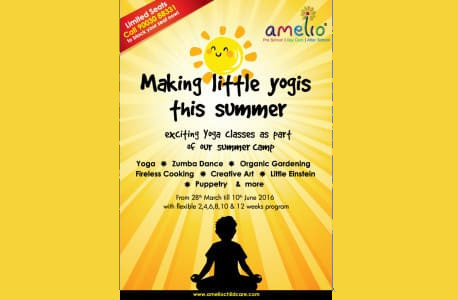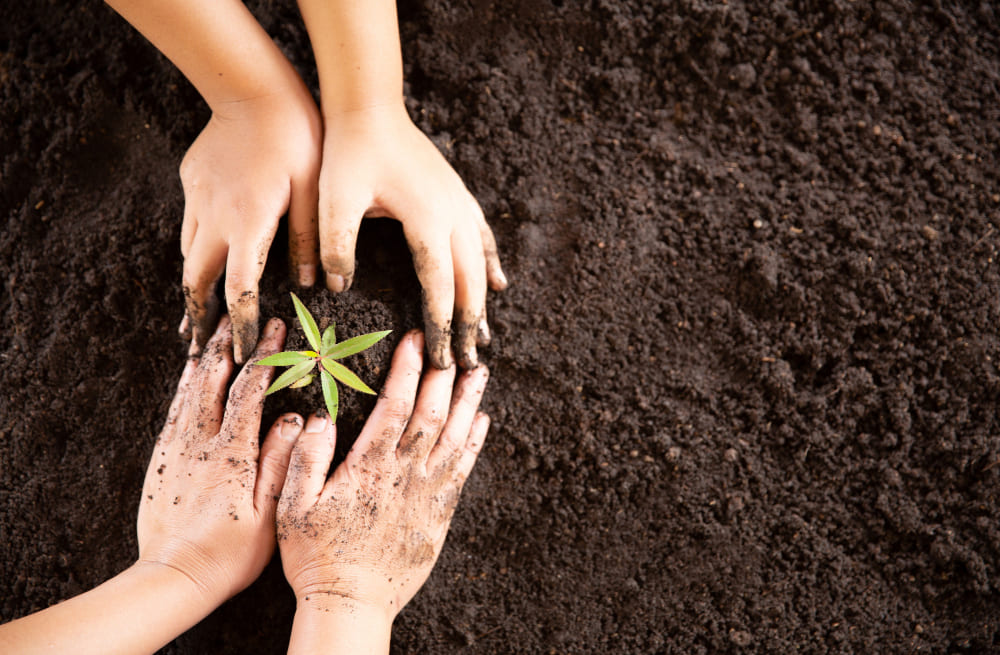Happy Mother’s Day!



 If you think Yoga is for grown ups, think again. Children love the challenge of Yoga exercises. But fun apart, there are immense benefits to introducing Yoga to children at an early age. Here are some clear benefits of Yoga for kids:
If you think Yoga is for grown ups, think again. Children love the challenge of Yoga exercises. But fun apart, there are immense benefits to introducing Yoga to children at an early age. Here are some clear benefits of Yoga for kids:
Because children learn the right technique of breathing, they overcome breathing ailments such as wheezing, allergic sneezes etc. Yoga helps children with the right posture, setting the fundamentals for a lifetime of healthy living.
Introduce your child to Yoga. It is a great exercise for your child, and helps them better their health as well. We have exciting Yoga classes as part of our summer camp. Call 90030 88331 for more information.

 Julia Donaldson has mastered rhythmic storytelling for children. This book is yet another reading delight from her stable.
Julia Donaldson has mastered rhythmic storytelling for children. This book is yet another reading delight from her stable.
The Magic Paintbrush a rhyming version of the traditional Chinese story in which a child (in this case a girl called Shen) is given a magic paintbrush which will bring to life everything that she paints – provided she only paints things for the poor and needy. When the greedy Emperor hears of the magic brush he demands that Shen paint him a tree of golden coins, and when she refuses he flings her into prison. How Shen escapes the prison and continues to use the magic paintbrush for the needy forms the plot of the story.
As a die-hard fan of Julia Donaldson, I found the narrative to be a deviation from her regular style, which is usually infused with humor. Inspite of this, the plot is gripping, written in simple, captivating verse and the illustrations are very charming.
It is a great read-aloud book for children, and chances are, after a few reads, your child will start narrating it all on his own, thanks to the rhyme.
So pick up this book and make this the night-time read for your child today. It’s a journey to a world you’ll both love.

 I know better. But I still have those moments with my 5-year old. For instance, she sometimes plays with her food and resists eating what is on her plate. I am usually very patient but there are days when I lose it.
I know better. But I still have those moments with my 5-year old. For instance, she sometimes plays with her food and resists eating what is on her plate. I am usually very patient but there are days when I lose it.
And immediately after, I feel a huge sense of remorse and guilt. So I make it up to her, and explain to her why I got upset, and what I really meant, and after an additional 10 minutes spent undoing that moment’s damage, we move on.
I have often wondered why I get angry at all and here is what I have learnt.
When I see my daughter resisting her food, I subconsciously extrapolate this act of hers far into her future. So while my daughter is playing with her food, I am creating an image of her as a fussy eater through school and college. I am already worrying about her future calorific intake and how I will be judged as a parent. While she is innocently playing with her fork, I am shifting blame and guilt in my mind and making up a set of strategies to “fix this forever”. And all my imagined failures as a parent and anxieties of the future make me explode. All this while my child is desultorily flicking the peas on her plate.
This was a startling revelation, and as I spoke about this with other moms, I realised that this is exactly the reason that most of us moms get angry with our children.
Our children live in the NOW. But we don’t. We constantly think and worry about the future in ways that we don’t even realise.
So the next time your child’s behaviour gets your back up, ask yourself this:
Am I most worried that this behaviour will become a habit in the future?
If the answer is yes, drink some water, calm down and tell yourself to forget about the future. Get back to the moment and look at that gorgeous child of yours who is reveling in the NOW. And then, you can calmly deal with what is in front of you. In that moment.

Why does every weekend activity with our children conclude with a big hole in your pocket? Don’t you wish there were something fun to do with kids that didn’t cost money? Well, there is hope. Here are some fun weekend activities to do with your child that’s a lot of fun, and involve no spends! Read on, there are no catches!
Go for a walk with your child (preferably early in the morning) and look for trees that are beginning to flower and bear fruit. Some examples are cotton trees, neem trees or mango trees. Have your child give that tree a name and identity, and observe the leaves, flowers, and birds. Take pictures and keep visiting that tree every few days. Your child will find it fascinating to watch how they change and flower. A sure-shot winner of an activity!
All you need to do is take two plates – leave some grains on one and fill up some water on the other. Leave them in your garden or balcony and watch as the feathered friends flock up to your doorstep to enjoy the party. And oh yeah, your kids will be glued to the place anticipating their arrival.
A good friend showed me this super hit activity. Take a few small squares of paper, and draw the rough images of things around your house on each of the paper squares. Some examples are a chair, a painting, a lamp etc. Keep the first clue with you. Go to the place you have indicated on your first clue and hide the paper square with the second clue. Go to the place indicated on your second clue and hide the third. Keep doing this till you exhaust all the paper squares. On the last place, hide a small gift. Kids feel like little detectives and have such an exciting time playing this game. If they are older, you can even write the clues out. Warning, this activity may be a bit too much fun!
Have your children draw something or write something, and put it in an envelope. Take them to the post office and have them post the letter to themselves. They love looking for the mail and expecting the letter to come back to them.
Involve your child in preparing some fresh buttermilk. Allow your little one to add in the ingredients and do the stirring. Take the buttermilk in a jug, take some disposable cups, and head outside. Have your child offer a glass of buttermilk to thirsty passers-by. This is such a useful thing to do for our community in the summer, and makes your child feel so proud of himself!
And if you have any fun things that you have tried and works, share them with us so we can share them with everyone. After all, we’re a “parent-ship” and we look out for each other!

It is not the quantity of time but the quality of time that makes a difference in your child’s life. You can make every minute count. Playing games is the easiest way to connect with your child.
Here is a set of ideas that will make learning occur naturally while it appears fun!
You can try these quick activities with your child while you are cooking, getting ready to work, ironing, shopping or eating. These activities will not only help you bond with your child but also help your child learn a few important concepts.
It is a nice way of introducing similar sounding phonics to your toddler. “Mama says, Cat” and your child responds with a Rat, Mat, Bat or Fat. You can increase the difficulty level based on your child’s language development.
It also builds your child’s vocabulary. You could also take turns in calling out objects that start with a specific letter such as ‘B’ or ‘D’.
I-Spy is a popular game that helps your little one learn new words. You spot an object in the room and say, “I spy with my little eyes, something starting with the letter ‘B’” and your child has to guess the word.
Mother and the child can take turns in guessing the object.
Once, while I was playing this game with my niece, she said, “Something starting with N”. Even after multiple guesses, I couldn’t find the object. She was elated and declared, “Knife!” I felt so sorry for her. I am sure you will have such moments too!
You can also try variations with colors like, “I spy with my little eyes, something in green.”
Collect small objects of the same shape. For example, sticky note, eraser, magnet, etc in square shape. Slip in an object of different shape, like a ball. Ask your child to pick the odd man out.
It helps your child recognize patterns and differentiate the odd from a set of common objects.
Children get restless if you take them along to shop groceries and vegetables. Here is how you can make it interesting by asking them to help you shop.
Ask them to count and drop fruits/vegetables into the basket. For example: “Mama is buying apples, can you pick 2 apples and put them into the basket please”. Engage them and give them a little responsibility, toddlers love acting older than their age.
You can also keep them guessing, “Mama is going to buy a fruit that is yellow, round and sweet. What do you think it is?” It is a nice way to teach your child the characteristics of various fruits and vegetables.
While you are in the kitchen, there are a number of ways you can engage your child. You can request your child to group the vegetables that you have in your fridge. It will hone your child’s sorting skills.
Place a few cups, mix a few beans and ask your child to sort them. It will improve your child’s attention and focusing skills.
It is a good idea to stock some ice cream sticks and straws at home. Give them a few sticks and ask them to make various shapes. If your child is a pro with shapes, ask them to make a house or a tower.
Draw up a big circle, square, triangle and rectangle on the floor. Now, ask your child to collect objects from home that match the shape and place it within.
You could either collect bottle caps of different colors or buy big buttons of different colors. Use an empty egg carton (color each compartment in a different color) to encourage your child to sort the caps/buttons into the compartments.
There are so many different things you can do in a minute! Focus your activities on Colors, Shapes, Numbers and Rhyming Sounds and am sure your toddler will love the challenge.